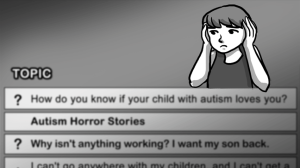Like many girls, I got my first sex tips from women’s magazines.
I learned how to stand to appear thinner when naked.
I learned which positions put my sexiest body parts on display.
I learned hundreds of ways I should touch a penis, whether I liked it or not.
Sex sounded grown-up and exciting, but also scary – though I couldn’t pinpoint why.
I totally see why now, though. It sounded like sex would make me an object – like once I walked through the door of a man’s (it was always presumed to be a man’s) bedroom, I’d leave my humanity on the other side of it.
Actually having sex as a teenager was equally confusing.
I wanted to be my partners’ hot, sexy lover and their fellow human, but it always felt like I had to pick one.
When I tried to be both, they’d punish me for it.
In college, after enthusiastically initiating a hookup with someone I met at a frat party, and openly enjoying it, he got behind me and air-humped me in front of his friend while I was trying to talk.
It felt like his way of saying, “In case you got as much out of this as me, I’m going to make sure you still don’t leave feeling equal” – as if my comfort with the situation took the fun away from him. As if he were trying to win a game aimed at convincing me to hook up, and I wasn’t even letting him play.
He’d learned it, too: that women’s role in sex was to deny or “give in to” what men wanted, not want anything themselves. (And that LGBTQIA+ people don’t exist, apparently.)
I didn’t just learn this from magazines.
I learned it from musicians who implicitly or explicitly referred to their sexual partners as “bitches,” “hos,” and conquests. I observed it on TV shows that existed to let men ogle naked women. I learned it from men who treated rape as “locker room” behavior.
Thankfully, during college and after, I absorbed other ideas about sex and women’s role in it.
Here are some of the healthier messages I got – and wish we’d all get sooner.
1. Do What You Desire, Not What You’re Just Okay With
Desire was strangely absent from the sex lessons I received from adults and peers alike – or at least the desires of people other than men were absent.
I learned all about men’s supposed desires. I learned men’s desires were uncontrollable. That they would try to use me to satiate them. That I had the “powerful” position of deciding if their desires would be fulfilled (if they were “nice guys” who didn’t rape, that is).
In addition to erasing non-binary people, this belief system renders women incapable of consent. You can’t, after all, consent to something you don’t desire.
So, until I understood that my desires mattered, sex seemed, by nature, non-consensual. No wonder it scared me.
Then, in my freshmen year of college, I went to a talk about sex. And unlike other sex talks I’d attended, it didn’t reduce women to victims. “Do what you desire, not what you’re just okay with,” the speaker said.
Before, I thought being okay was the most I could hope for. I thought if a guy wants to do something and you’re okay with it, it was just spiteful not to let him do it.
But, as this speaker recognized, that sets you up for an unequal exchange and makes consent blurry.
Instead, he suggested, say no if you’re not excited about something, and you can always change your mind.
I learned another version of this advice at a cuddle party years later: “If it’s not a ‘hell yes,’ it’s a ‘no.'”
By affirming people’s right to say hell yes, we help them say no when there’s no hell yes in them. And by affirming their right to say no, we make room for more hell yeses to safely come out.
2. Express What You’re Thinking – And Ask Your Partner What They’re Thinking
Women’s magazines offered tips for the hottest things to say in bed, but they rarely taught me to express how I actually felt. And they also didn’t teach me how to figure out how my partners felt.
Any vocalizations that happened in bed were supposed to be for the sake of a performance.
Communication in the bedroom should accomplish the opposite, though: expressing what you’re truly thinking.
I didn’t know it was okay to say I wanted sex, or more sex, or a different kind of sex.
I didn’t know it was okay to admit the current activity was doing absolutely nothing for me. I didn’t know it was okay to say if I was in pain or to say I felt pressured into something.
Those things weren’t “guaranteed to turn him on,” after all.
But expressing what you’re thinking is more than okay. It should be a requirement, especially if the alternative is to be uncomfortable or unsatisfied.
This also means it’s important to find out what your partners are thinking, particularly when you’re not sure what they want.
Discussions of sexual violence usually paint women merely as potential victims or survivors, but we are highly capable of ignoring others’ boundaries and pressuring them.
Instead of teaching women to merely compliment their partners’ sexual prowess, questions like: “Do you want this? Are you good? What do you want? Do you like that?” should be part of everyone’s vocabulary.
This not only makes sex better, but it’s also vital for keeping it consensual.
And no, it doesn’t “kill the mood.”
In what other activity is talking to your companion considered a detraction from the fun?
3. Make Sure You’re Getting as Much Out of This as Your Partner (And Vice Versa)
I put that second part in parentheses because women already know this. We’re taught it’s our job to ensure our partners are getting at least as much out of the encounter as we are.
In a study on college students’ attitudes toward hookups, one woman said, “I will do everything in my power to like whoever I’m with, to get [him] off.”
And here’s what another woman said of receiving pleasure in hookups: “I didn’t feel comfortable, I guess. I don’t know. I think I felt kind of guilty almost, like I felt like I was kind of subjecting [guys] to something they didn’t want to do, and I felt bad about it.”
It makes sense, then, that men are more likely to receive oral sex than women during college hookups, and both teen boys and girls say oral is a bigger deal when it’s performed on a woman.
I always thought I understood that I deserved as much as my partners. It seems like common sense that both people should get something equal out of every exchange, right?
But like the latter student, I never expected orgasms from my sexual encounters.
Since I wasn’t getting them, I assumed my body was just too difficult, even though it wasn’t difficult when I was on my own.
That’s what we’re taught: “Women are harder to please. Our bodies are ‘tricky.’ Men are microwaves, while women are ovens.” (Wrongfully assuming that all women are cisgender, these statements usually attribute such differences to sexual anatomy.)
Then, when we don’t get much pleasure out of sex, we think, “Welp, that’s just my body being all womanly and complicated again.”
No. It’s not.
It could be a number of things, like anxiety getting in the way, lack of knowledge on your or your partners’ part, or a lack of effort on their part.
But it’s not the inevitable result of you being a woman.
We deserve to stop resigning ourselves to “meh” sex lives, and go after what we want.
The idea that we shouldn’t pursue our desires sets us back in all sorts of ways outside the bedroom. It’s time we take back our right to pleasure in all areas.
***
What all these tips basically boil down to is: “It’s totally valid to have a sexuality, express it, and expect others to care about it.”
I never cease to be amazed by how confused people are when women have a sexuality.
When I talk about masturbation, porn, or anything else to even suggest I’m a sexual being, one of several things happens:
- People assume I’m looking to be subservient to men because I’m obviously just sexual for them.
- They resent me for seeking my own pleasure.
- They assume I’m just hypersexual and “out-there.”
When people react negatively to women being sexual, what they’re really doing is reacting negatively to women being human. And when we teach women not to be sexual and just be sexy, we’re denying their humanity.
Of course, women – and everyone – can be sexy if they want. But they also, unconditionally, deserve the right to be sexual, whether they’re sexy or not.
I hope that one day, it’ll be normal for a woman to have a sexuality – because that’ll mean people will honor her expression of it.
I also hope people abandon the cliché “women want this, men want that” model of sex and honor the sexualities of people of all different genders and sexual orientations.
And I hope we can move toward that by giving everyone these alternative “sex tips.”
[do_widget id=’text-101′]
Suzannah Weiss is a Contributing Writer for Everyday Feminism. She is a New York-based writer whose work has appeared in The Washington Post, Salon, Seventeen, Buzzfeed, The Huffington Post, Bustle, and more. She holds degrees in Gender and Sexuality Studies, Modern Culture and Media, and Cognitive Neuroscience from Brown University. You can follow her on Twitter @suzannahweiss. Read her articles here.
Search our 3000+ articles!
Read our articles about:
Our online racial justice training
Used by hundreds of universities, non-profits, and businesses.
Click to learn more
Most Read Articles
- « Previous
- 1
- …
- 30
- 31
- 32




















